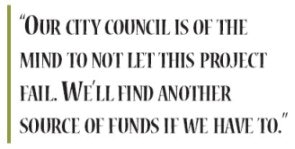In California, the decision to rescind state grant funding leaves municipal rec projects in limbo

As his state's chief check-writer, California State Controller Steve Westly holds the fiscal authority to giveth and taketh away. This fall, Westly exercised the latter power by rescinding more than $15 million in legislative grants administered through California State Parks for local parks, recreation and other community-oriented capital projects.
Westly did not act arbitrarily. In August, the San Francisco Chronicle reported what, as of this writing, appears to be an isolated case of misuse of parks grant funds. According to the paper, a San Francisco nonprofit organization received a $500,000 grant during the 2000 state legislative session for a community center that was never built. An ongoing federal investigation has suggested that more than $125,000 of that grant money, after changing hands several times, ultimately ended up in the campaign coffers of California's current secretary of state, who happens to be a political associate of the grant recipient's executive director.
This case of alleged abuse led Westly and his office to stop payment of $15.5 million of the $102.1 million in grant funds awarded from 2000 to 2002, and launch a full-scale audit of as many as 20 grant recipients. The audits target nonprofit organizations, as well as municipal parks and recreation agencies throughout the state, including several in the San Diego metropolitan area.
Over the past several years, the San Diego Park & Recreation Department has received state parks grants for 14 capital projects, one of which falls under the direct purview of the local nonprofit Mission Trails Regional Park Foundation. Of the $3.82 million allocated for those 14 projects, $2.1 million is currently being held. Despite not knowing when, or if, those funds will be released, city recreation officials are doing their best to conduct business as usual. "The city is fronting the money and we're proceeding with these projects. Some projects are finished, we just haven't been reimbursed for them yet," says Carol Wood, San Diego Park & Recreation's grant administrator. "The alternative is to stop the remaining projects mid-construction until we hear otherwise, but we can't really do that."
Officials with National City, a suburb of San Diego, are taking a similar stance. In 2000, the California State Legislature approved for National City a $147,750 grant to help renovate a public pool that is more than 50 years old. "Our city council is of the mind to not let this project fail. We'll find another source of funds if we have to," says assistant city manager Park Morse. "This pool is the only one the community has. It's too important."
The real issue isn't whether the California State Controller's Office deems the 20 projects it has earmarked for in-depth auditing to be vital. It does, says spokeswoman Laura Adleman. The state controller's true concerns lie in whether the grants have been used for their intended purposes, and how to correct a grants process he believes is in need of a tune-up.
These are fair and necessary questions, one could say, particularly considering the pledge made to California residents last fall by incoming Gov. Arnold Schwarzenegger to whittle away at the state's $15 billion budget deficit. "We found problems every step of the way," said Westly in a prepared statement this September. "Some groups didn't know they were getting a grant. Others didn't know what to do with it. It's time to pull the plug. Today, we are taking action to save up to $15 million in taxpayer funds, and fix a process that's broken."
Among those Westly and his staff fault are the legislators who created the parks grant program and approved its funding. "We found in our initial survey that the language used by the legislators to define what exactly the project money should go toward was often very vague," says Adleman.
Still, in the eyes of the state controller, the legislators aren't as much to blame as are officials with California State Parks. In the state controller's office's initial "risk assessment survey," the agency was sharply criticized for inconsistent administrative oversight, for not having a "formal policy or procedures to monitor the status of projects that received advance payments," and for devoting "very limited resources for auditing legislative grants." California State Parks has made few attempts to respond publicly to these allegations, and though contacted on several occasions by AB, agency officials failed to respond to the magazine's interview requests.
Wood, for one, will go on record to defend the state parks department. "We have a very good relationship with State Parks," she says. "I can't speak for all offices, because they're divided regionally, but we felt our representatives were proactive and made sure we met the legislative intent of the funding. They come down here to check our projects regularly. We have an open dialogue with them, and as far as I can tell, they're right on top of things."
Some observers believe that the real bone of contention between the state parks department and the state controller's office has little to do with legislative intent or fiscal oversight. Rather, it could all boil down to a disagreement concerning how long grant recipients have to spend their money. According to California State Parks, grant recipients are allowed five years from the signing date of their contracts with that agency to spend grant funds. However, the state controller's office, citing the state's budget act, says that grant recipients have three years from the awarding of that grant to encumber, or commit, the funds (signing a contract with an architect, for example, would constitute encumbrance). From the date of encumbrance, a grant recipient has two years to spend the money.
It's hard for Wood to see the practicality of the legislation cited by the controller's office. "In a lot of cases, we use a design-.build firm," she says. "We're saving money that way, but as you know, if you're using one design-build firm for multiple projects, it's going to take longer than two years - especially with the community being very involved in the design process."
That said, Wood would like to believe that her signed contracts with the state parks department, which give the city of San Diego until June 30, 2005, to spend grant funds, are binding. But in light of this controversy over contract terms, she now feels as if she has just as much cause to worry. "What's happening is that, after the fact, the state controller's office is trying to change the terms of the contract agreed to between us and State Parks," she says. "Hopefully, this matter will be resolved quickly. If not, I don't know what we'll do. We've done everything we can to live up to the contract terms. But if the contract is changed, we're really concerned because we have projects that haven't even started yet."
At least Dorothy Leonard doesn't have that concern. Leonard is secretary-treasurer of the Mission Trails Regional Park Foundation, which manages the 5,800-acre natural and developed recreation area located eight miles northeast of San Diego. In 2000, her foundation received a $985,000 grant to help pay for a $2.5 million equestrian staging area, which includes a parking lot and 11 acres of landscaping. The project wrapped up late this summer. However, Mission Trails Regional Park Foundation's final $98,500 reimbursement payment has yet to arrive, and given the pace at which the state controller's audits are being conducted, that check might not come any time soon.
Still, Leonard says that she has been mostly satisfied with the grants process, and in contrast to allegations made by the state controller's office, she contends that the state parks department has improved its fiscal oversight controls. "This is the second time we've applied for and gotten a grant," she says, adding that for a state parks grant-assisted project 10 years ago, 10 percent of the funds was paid up front and the remaining 90 percent was paid upon completion. "This time, it was 10 percent, then 80 percent, then the final 10 percent with a certificate of completion. We've had to send more documentation to the state this time around. So they've increased the oversight in that respect."
But with respect to the state parks department's policy for project monitoring, or the lack thereof, Leonard does see the state controller's point. "State Parks has not asked us for quarterly reports," she says. "California has very strict environmental laws. For example, we have only six months during which we can do construction louder than 60 decibels. We also have an area formerly used by the Marines and the Navy, so the Army Corps of Engineers had to do an ordnance sweep, even though all they found were tank parts and horseshoes. They tried to delay us more, but I finally wrote a letter that said, 'If you delay us any longer, we're going to lose grant money.'
"This project would have been finished last summer if the landscape contractor hadn't walked off the project site. He went bankrupt, so we had to find a new landscape sub, and we're talking about 11 acres. We would have been very happy to provide State Parks reps quarterly reports. For them to include these reports in the packet, it wouldn't require much more time on their part."
All things considered, Leonard isn't losing too much sleep over the auditing of her foundation's project. As of this writing, she had met several times with representatives of the state controller's office, including once during their visit to the Mission Trails park project site. "I have no problem with the audit, because we spent the money on what we were supposed to. We have all the documentation," she says. "I agree that they should be going in and doing audits. I don't know how many parks grants the state controller's office usually audits each year, if any. I think it's nice to do a certain percentage of them, just to make sure the money's being properly used. Is it fair to target all the nonprofits because of the actions of one? That's a judgment call."




































